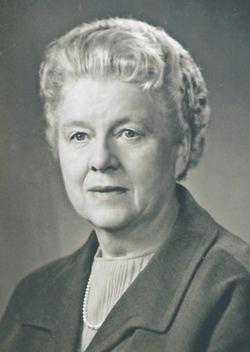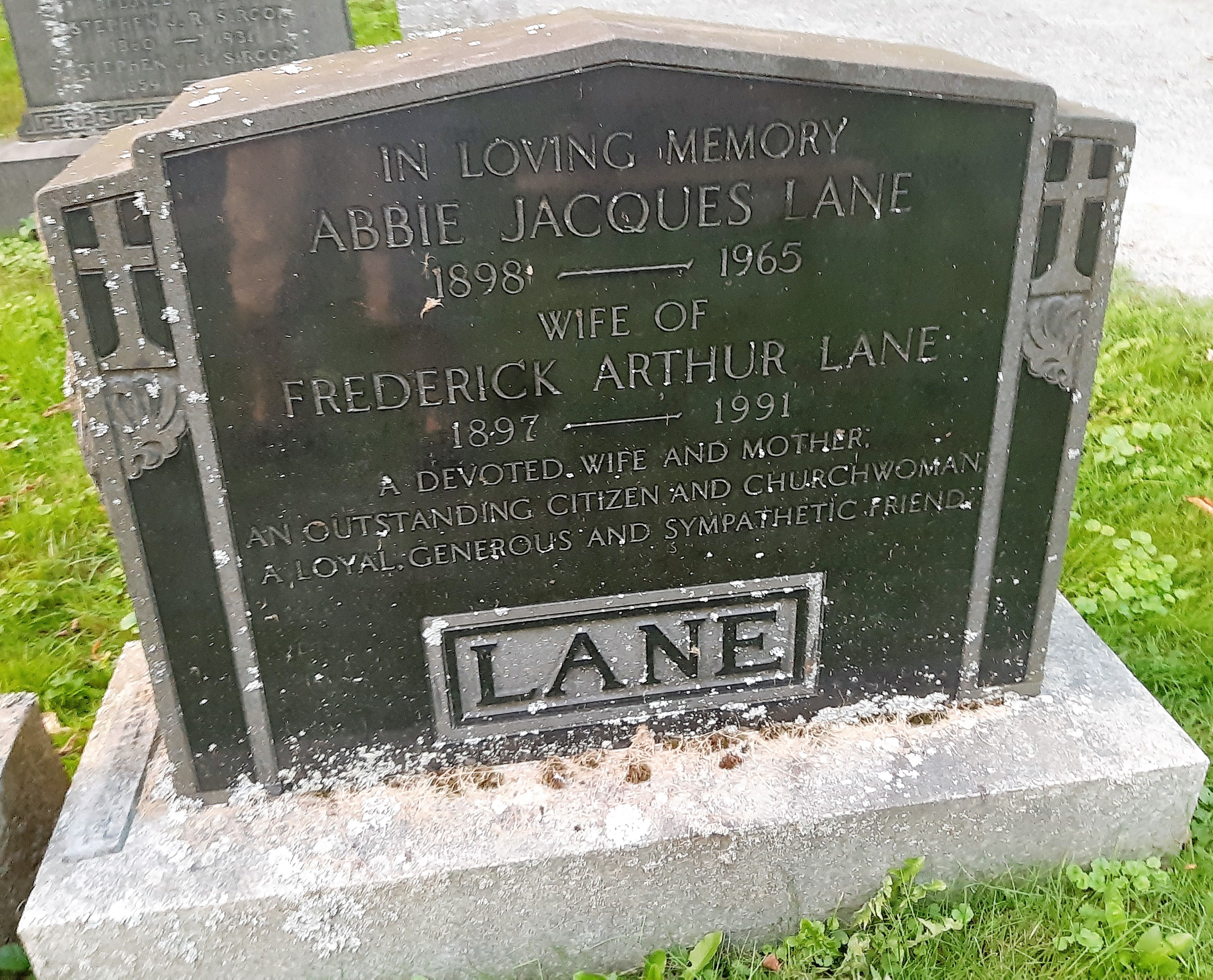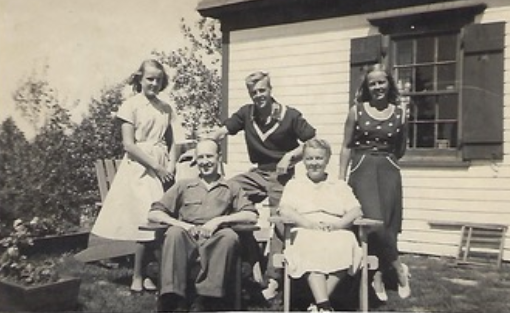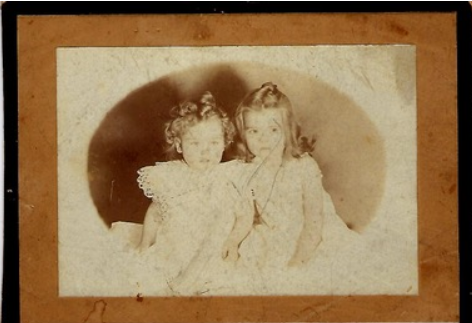Lane was born Abigail Amanda Jacques in Halifax in 1898 to Dr. Hartley Jacques and Margaret Locke Jacques.
Abbie's father Hartley was an alcoholic whose drinking become worse after Lane's younger sister, Estelle (Stella), died from spinal meningitis at the age of three.
Divorce wasn't an option then, so Margaret Jacques took young Abbie to live at her sister's house. In 1904, the pair went to New York and lived in a boarding house in Brooklyn, where Margaret Jacques worked low-paying jobs.
When Hartley Jacques died, Abbie Jacques and her mother moved back to Nova Scotia, first living in Truro. As a young woman, she worked as a teller in a bank in Truro, eventually getting a transfer to Halifax. In the city, Abbie Jacques met her fiancé, Frederick A. Lane, who later became manager and secretary/treasurer of the Nova Scotia Savings, Loans, and Building Society.
Abbie Jacques and Frederick Lane were engaged for six years while Abbie took care of her mother, who suffered from uterine cancer. The couple got married one year to the day Margaret Jacques died.
Abbie Lane later worked at CJCH, which was then on the top floor of the Lord Nelson Hotel, where she was a woman's commentator.
"She'd go off to the radio station for her program, which I think was at 10:45 in the morning," Duncan says. "If I was home sick in bed, I remember she'd always end the program with 'This is Abbie Lane. Good morning, ladies.' And then she'd say, 'Good morning, Jean,' which thrilled me."
Duncan says her mother was an advocate for the city's poor and she served as the president of the Halifax Welfare Bureau for six years. She was on the city's civic planning committee, which spent and helped draft Halifax's master plan. Over the years, Lane's contribution to the community would include her role as president of Zonta Club of Halifax, president of Halifax Women of Rotary, president of the women's branch of the Women's Press Club, and a member of national board of directors of the Canadian Mental Health Association. Lane served as provincial president with the Imperial Order, Daughters of the Empire. In 1959, Lane represented Canada at an international women's conference in Bogata, Colombia.
Duncan was in Grade 6 when her mother decided to go into politics. She ran in a by-election in Ward 2 after the death of Charles Hosterman in 1951.
"I think women have a big role to play in the community and I decided to play mine," Abbie Lane told reporter David MacDonald of Macleans.
Frederick Lane was one of Abbie Lane's biggest supporters.
Lane defeated Allan M. Butler in that by-election 1254 votes to 675. Lane served as alderman for Ward 2 for 14 years. She served as deputy mayor, the city's first woman in the role, from 1954 to 1955. Even then, Duncan knew what her mother's win meant.
Lane always had her eye on becoming the city's first woman mayor, although Duncan says she doesn't think her mother was thinking about running that soon after being elected alderman. She does think her mother had supporters to run.
In those days, mayoral terms were alternated between Protestant and Catholic candidates, and Lane could only run in a Protestant term. Lane could have run in 1960, the year Jean and Peter Duncan married, but Duncan says her mother didn't want a campaign to distract from that celebration.
In October 1965, Duncan says Lane told her family and close friends she was planning to run.
"We thought it was long overdue," Duncan says.
But Lane never got to campaign. Duncan says the family knew she was ill, but Lane was private about how she was feeling. Jean and Peter Duncan came home that summer from Philadelphia and Jean Duncan encouraged her mother to go home with them for treatment.
"She said I'm not seeing any doctors if there's anything wrong with me," Duncan recalls. "I have no intention of doing anything about it."
Lane was admitted to the hospital with a collapsed lung on Dec. 3, Duncan's birthday. Lane was diagnosed with non-Hodgkin's lymphoma and was about to start chemotherapy.
"Mother was terrified of dying of cancer because her mother had a very painful death," Duncan says.
The next morning, Lane suffered a massive heart attack and died. She was 67.
she had 3 children.
Lane was born Abigail Amanda Jacques in Halifax in 1898 to Dr. Hartley Jacques and Margaret Locke Jacques.
Abbie's father Hartley was an alcoholic whose drinking become worse after Lane's younger sister, Estelle (Stella), died from spinal meningitis at the age of three.
Divorce wasn't an option then, so Margaret Jacques took young Abbie to live at her sister's house. In 1904, the pair went to New York and lived in a boarding house in Brooklyn, where Margaret Jacques worked low-paying jobs.
When Hartley Jacques died, Abbie Jacques and her mother moved back to Nova Scotia, first living in Truro. As a young woman, she worked as a teller in a bank in Truro, eventually getting a transfer to Halifax. In the city, Abbie Jacques met her fiancé, Frederick A. Lane, who later became manager and secretary/treasurer of the Nova Scotia Savings, Loans, and Building Society.
Abbie Jacques and Frederick Lane were engaged for six years while Abbie took care of her mother, who suffered from uterine cancer. The couple got married one year to the day Margaret Jacques died.
Abbie Lane later worked at CJCH, which was then on the top floor of the Lord Nelson Hotel, where she was a woman's commentator.
"She'd go off to the radio station for her program, which I think was at 10:45 in the morning," Duncan says. "If I was home sick in bed, I remember she'd always end the program with 'This is Abbie Lane. Good morning, ladies.' And then she'd say, 'Good morning, Jean,' which thrilled me."
Duncan says her mother was an advocate for the city's poor and she served as the president of the Halifax Welfare Bureau for six years. She was on the city's civic planning committee, which spent and helped draft Halifax's master plan. Over the years, Lane's contribution to the community would include her role as president of Zonta Club of Halifax, president of Halifax Women of Rotary, president of the women's branch of the Women's Press Club, and a member of national board of directors of the Canadian Mental Health Association. Lane served as provincial president with the Imperial Order, Daughters of the Empire. In 1959, Lane represented Canada at an international women's conference in Bogata, Colombia.
Duncan was in Grade 6 when her mother decided to go into politics. She ran in a by-election in Ward 2 after the death of Charles Hosterman in 1951.
"I think women have a big role to play in the community and I decided to play mine," Abbie Lane told reporter David MacDonald of Macleans.
Frederick Lane was one of Abbie Lane's biggest supporters.
Lane defeated Allan M. Butler in that by-election 1254 votes to 675. Lane served as alderman for Ward 2 for 14 years. She served as deputy mayor, the city's first woman in the role, from 1954 to 1955. Even then, Duncan knew what her mother's win meant.
Lane always had her eye on becoming the city's first woman mayor, although Duncan says she doesn't think her mother was thinking about running that soon after being elected alderman. She does think her mother had supporters to run.
In those days, mayoral terms were alternated between Protestant and Catholic candidates, and Lane could only run in a Protestant term. Lane could have run in 1960, the year Jean and Peter Duncan married, but Duncan says her mother didn't want a campaign to distract from that celebration.
In October 1965, Duncan says Lane told her family and close friends she was planning to run.
"We thought it was long overdue," Duncan says.
But Lane never got to campaign. Duncan says the family knew she was ill, but Lane was private about how she was feeling. Jean and Peter Duncan came home that summer from Philadelphia and Jean Duncan encouraged her mother to go home with them for treatment.
"She said I'm not seeing any doctors if there's anything wrong with me," Duncan recalls. "I have no intention of doing anything about it."
Lane was admitted to the hospital with a collapsed lung on Dec. 3, Duncan's birthday. Lane was diagnosed with non-Hodgkin's lymphoma and was about to start chemotherapy.
"Mother was terrified of dying of cancer because her mother had a very painful death," Duncan says.
The next morning, Lane suffered a massive heart attack and died. She was 67.
she had 3 children.
Inscription
A devoted wife and mother. An outstanding citizen and churchwoman. A loyal generous and sympathetic friend.
Family Members
Sponsored by Ancestry
Advertisement
Records on Ancestry
Advertisement










